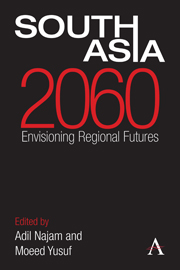Book contents
- Frontmatter
- Contents
- Acknowledgments
- List of Abbreviations
- Introduction: Imagining South Asian Futures
- Section I South Asia as a Region
- Chapter 1 Prisoners or Masters of Destiny?
- Chapter 2 South Asian Futures: Three Scenarios
- Chapter 3 Federalism on the Road: Region and Regionalism
- Chapter 4 Diversity in South Asia
- Chapter 5 Future's Past
- Section II State Relations
- Section III Development
- Section IV Human Well-Being
- About the Authors
- Bibliography
- Index
Chapter 3 - Federalism on the Road: Region and Regionalism
from Section I - South Asia as a Region
Published online by Cambridge University Press: 05 September 2013
- Frontmatter
- Contents
- Acknowledgments
- List of Abbreviations
- Introduction: Imagining South Asian Futures
- Section I South Asia as a Region
- Chapter 1 Prisoners or Masters of Destiny?
- Chapter 2 South Asian Futures: Three Scenarios
- Chapter 3 Federalism on the Road: Region and Regionalism
- Chapter 4 Diversity in South Asia
- Chapter 5 Future's Past
- Section II State Relations
- Section III Development
- Section IV Human Well-Being
- About the Authors
- Bibliography
- Index
Summary
A critical dysfunction was created as the British sun set on the Subcontinent, for it left two countries trying to develop competitive nationalist sensibilities in the bitter aftermath of Partition. Each new country required a manufactured nationalism, with its mix of symbolism and an exclusive if not customized history. Before long, one of the partitioned countries had broken into two, each requiring its own nationalist narrative, and that is how South Asia has developed centrifugally these last six decades, time spent defining the distance between the power elites of Dhaka, New Delhi, Kathmandu, Colombo and Islamabad. This agenda has affected the possibilities of an economically productive, socially inclusive South Asian regionalism on the one hand, and, on the other, diverted focus from representative, accountable democracies at the provincial and district levels. The capital establishment in each country has sought to consolidate itself by force-feeding the populace with conspiracy-laden xenophobia to be called up at will, all the while keeping at bay the demand for devolution of power to states and provinces.
The brittle capital-centric evolution of the countries of South Asia is tailor-made for egotistic, exclusivist nationalism. This type of nationalism not only regards its neighbors with suspicion, but also fails to embrace even those it claims to be its own – where New Delhi does not countenance flexibility on Kashmir, Islamabad on Sindh or Balochistan, Dhaka on the Chittagong Hill Tracts, Colombo on the north and east, and so on.
- Type
- Chapter
- Information
- South Asia 2060Envisioning Regional Futures, pp. 29 - 37Publisher: Anthem PressPrint publication year: 2013

